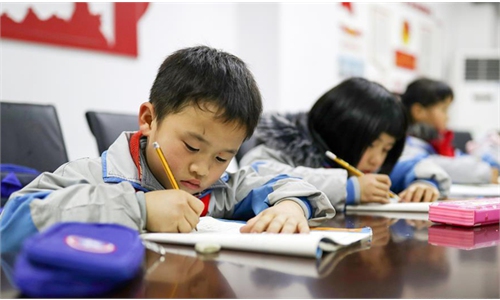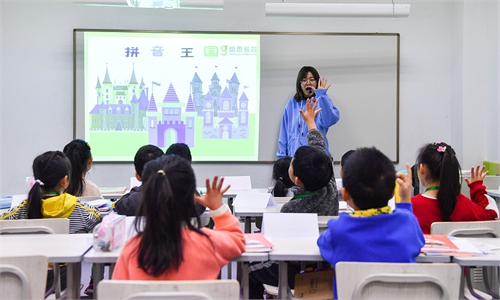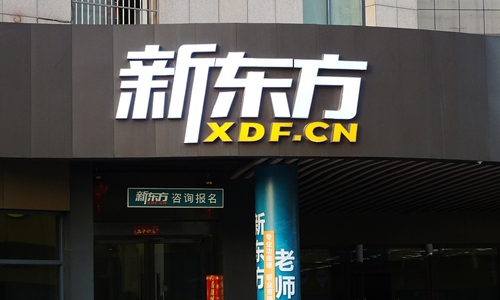Regulation dealing 'fatal blow' to private education sector could lead to delisting: analysts

One-on-one online education Photo: VCG
Shares of Chinese private tutoring companies continued to fall on Tuesday, after the central government released a guideline on Saturday to regulate the private education industry.
Analysts and market observers said that private tutoring institutions faced the risk of delisting if their primary businesses couldn't be quickly adjusted.
"Bigger companies have the financial resources to make successful transformations, but some small and mid-sized institutions may fail in the process," Dong Dengxin, director of the Finance and Securities Institute at the Wuhan University of Science and Technology, told the Global Times on Tuesday.
Doushen (Beijing) Education & Technology shares closed 11.6 percent lower on Tuesday. TAL Education's shares plunged 25.5 percent on Monday on the US stock market. New Oriental Education and Technology shares sank 33.3 percent in the US on Monday and 8.6 percent in Hong Kong on Tuesday.
"Obviously, off-campus training institutions inevitably face strict supervision of their training time, schedules, content, financing charge, qualifications, teacher sources and other aspects of their business, and their profits will be under unprecedented pressure," Zhang Jiayong, a research fellow at the National Center for Education Development Research, told the Global Times on Tuesday.
Curriculum-based tutoring institutions are barred from raising funds from the capital markets. Listed companies shall not invest in curriculum-based institutions through financing or purchase the assets of institutions by issuing shares or paying cash, read the guideline issued by the General Office of the Communist Party of China (CPC) Central Committee and the General Office of the State Council on Saturday.
Foreign capital may not control or participate in the private education sector through mergers, acquisitions, entrusted operations, and franchise chains.
"Private tutoring institutions face the risk of delisting. A company can be delisted from China's A-share market if it meets one or several conditions," said Dong. One crucial condition is that a company will be delisted if its shares fall by the daily limit on 20 consecutive trading days.
Companies said that there will be a huge impact on their businesses, although some of them still expect they will not be recognized as curriculum-based institutions.
"The majority of our products target oral English and English reading skills training. These products cannot be directly defined as 'curriculum-based tutoring courses', so this might sustain our company's operation temporarily," a staff member from VIPKID, a Chinese one-on-one English tutoring agency, told the Global Times on Tuesday on condition of anonymity.
According to the guideline, cities must no longer approve new curriculum-based institutions for students in primary and secondary schools, and existing institutions will be registered as non-profit organizations.
As for non-curriculum-based institutions, local governments should distinguish between sports, culture, art, science and technology and other categories to strictly examine their business.

Children take part in a roller skating training course in Lianyungang, East China's Jiangsu Province, on July 18, 2021. Photo: VCG
"Chinese shares in the education sector are likely to fall further. If the shares of a company fall too much, it will be cut off from financing sources, and the cost of staying listed won't be worth it. So companies may take the initiative to delist.
"Further, a passive delisting may be triggered if a company's stock price remains too low," Bai Wenxi, chief economist of IPG China, told the Global Times on Tuesday.
Industry sources suggested that business transformation could include a shift to non-disciplinary training, vocational training, and healthcare services for the elderly. Partnerships with public schools could also be possible.
However, Dong suggested that transformation will require investment and time.
"Most of the finished education products of curriculum-based tutoring institutions including courses, textbooks and teachers, might be wasted," said Dong.



